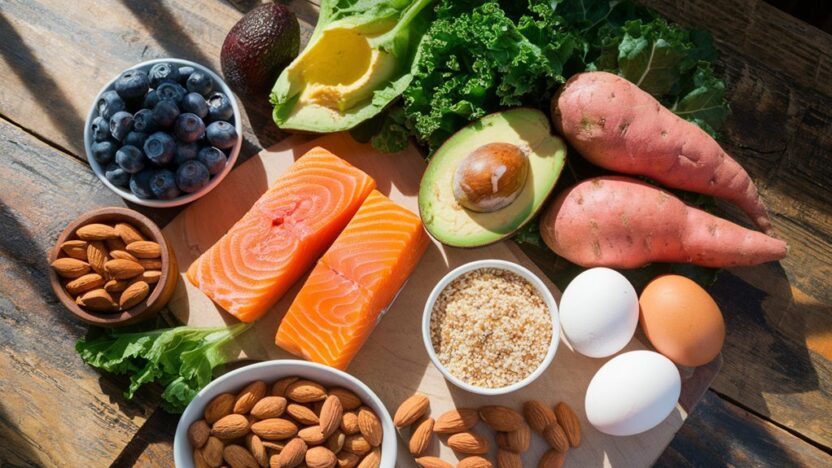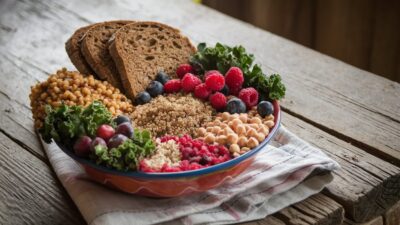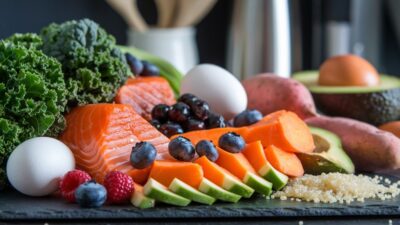Nutrient-dense foods pack the most vitamins, minerals, and beneficial compounds into every bite while keeping calories relatively low. You’ll find these powerhouse foods in both plant and animal sources, from dark leafy greens and colorful berries to salmon and lean meats. They’re essential for maintaining your health, boosting immunity, and supporting everything from brain function to bone strength. When you’re planning meals, focus on whole, unprocessed options like vegetables, fruits, legumes, nuts, and lean proteins. Smart storage techniques will help preserve their nutritional value, and proper meal planning guarantees you’re getting the most benefit. There’s much more to discover about maximizing these nutritional champions in your diet.
What Are Nutrient-Dense Foods
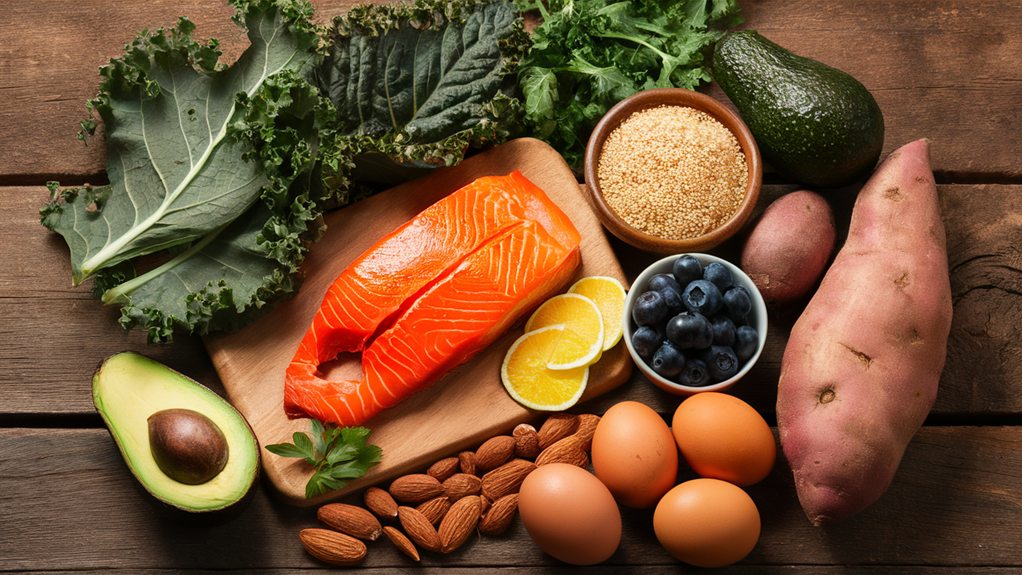
Nutrient-dense foods pack the highest amounts of vitamins, minerals, and other beneficial compounds into the fewest calories. When you’re choosing what to eat, these powerhouse foods give you the most nutritional bang for your buck, helping your body thrive while keeping calorie counts in check.
Incorporating a variety of nutrient-dense foods can guarantee you’re getting essential macronutrients and micronutrients, which are crucial for maintaining overall health and wellness, as highlighted in essential elements of a balanced diet.
You’ll often hear nutrient-dense foods referred to as “superfoods,” but they’re really just whole, unprocessed foods that naturally contain lots of important nutrients. Think of colorful vegetables like kale, spinach, and sweet potatoes, or protein-rich options like salmon, eggs, and legumes.
These foods aren’t just filling; they’re working overtime to provide your body with essential nutrients it needs to function at its best.
Understanding nutrient density means looking at the full picture of what a food offers, not just its calorie count. For example, while an apple and a handful of candy might’ve the same calories, the apple provides fiber, vitamins, and antioxidants, making it the nutrient-dense choice.
Benefits for Your Health

Regularly consuming nutrient-rich foods delivers profound benefits for your overall health and longevity. When you eat foods packed with essential vitamins, minerals, and antioxidants, you’re giving your body the tools it needs to function at its finest, fight off diseases, and maintain ideal energy levels throughout the day.
Incorporating anti-inflammatory foods into your diet can further enhance these benefits, helping to manage or prevent chronic diseases such as heart disease, diabetes, and arthritis.
Your immune system becomes stronger when you prioritize nutrient-dense foods, helping you ward off common illnesses and recover more quickly when you do get sick. These powerful foods also support your brain health, improving memory, focus, and cognitive function as you age.
You’ll notice better digestion, clearer skin, and stronger bones and muscles, thanks to the concentrated nutrients working together in your body. Additionally, nutrient-rich foods help regulate your blood sugar, reduce inflammation, and protect your cells from damage caused by environmental stressors.
When you make these foods a regular part of your diet, you’ll likely find that you maintain a healthy weight more easily, sleep better at night, and experience improved mood stability throughout the day.
Top Plant-Based Nutrient Sources
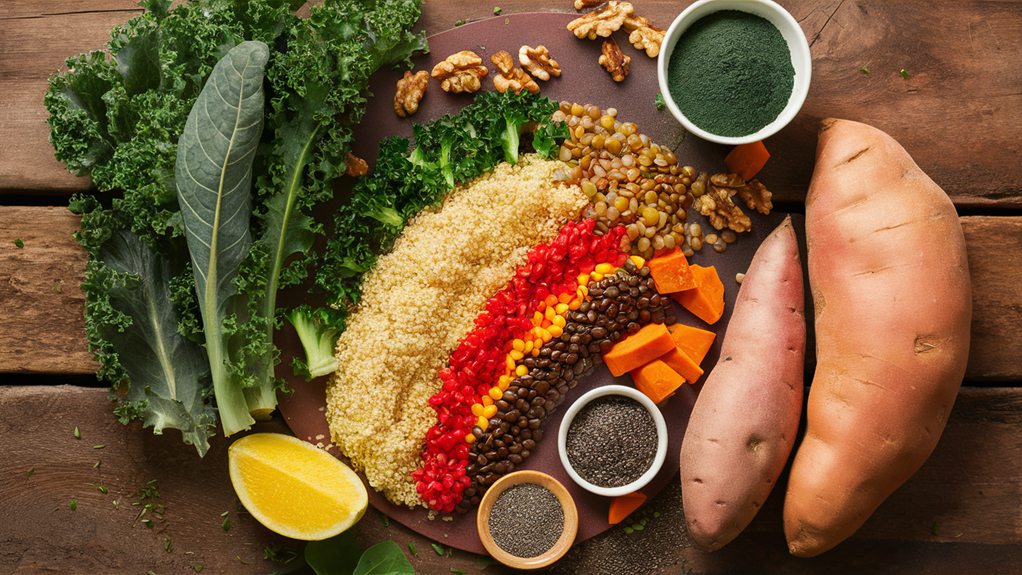
Plant-based foods offer some of the highest concentrations of vitamins, minerals, and antioxidants you’ll find in any food group. When you’re looking to boost your nutrition naturally, dark leafy greens like kale, spinach, and Swiss chard should be at the top of your list, as they’re packed with iron, calcium, and essential phytonutrients that support your immune system.
Embrace plant-based nutrition for better health by incorporating these nutrient-dense options into your diet.
You’ll find incredible nutrient density in colorful vegetables and fruits, especially those with deep, rich hues. Sweet potatoes provide generous amounts of vitamin A, while bell peppers deliver more vitamin C than oranges.
Berries, particularly blueberries and blackberries, are loaded with antioxidants that help protect your cells from damage. Don’t overlook legumes, like lentils and chickpeas, which offer protein, fiber, and crucial minerals.
Seeds and nuts are another powerhouse category you shouldn’t miss. Chia seeds, flaxseeds, and walnuts provide omega-3 fatty acids, while pumpkin seeds are rich in zinc and magnesium.
For maximum benefits, try to include a variety of these plant-based foods in your daily meals, focusing on eating the rainbow of colors nature provides.
Animal-Based Nutrient Powerhouses
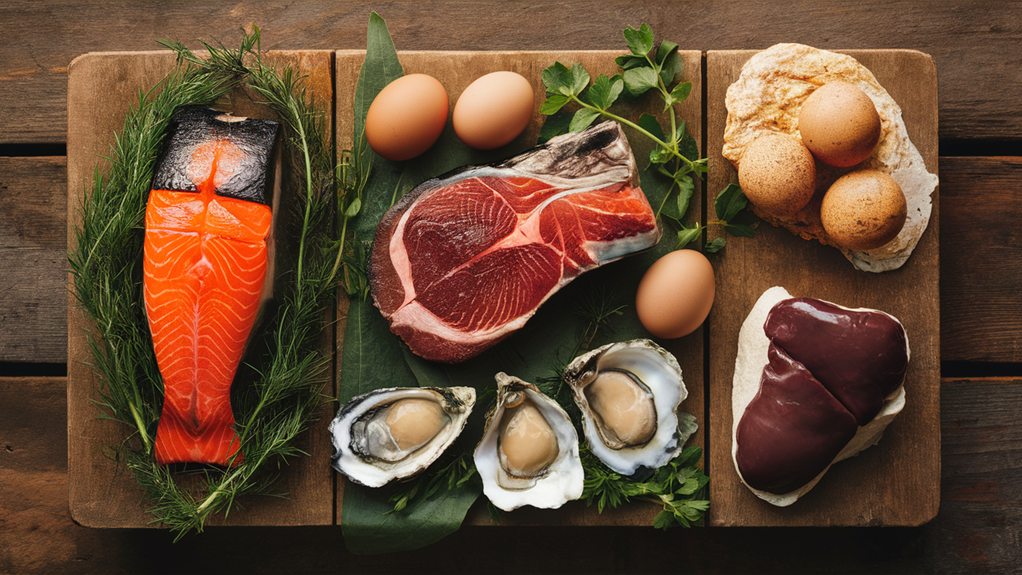
Animal products provide some of the most concentrated sources of essential nutrients in nature. When you’re looking to boost your nutrient intake, foods like eggs, fish, and lean meats can deliver an impressive array of vitamins and minerals in relatively small portions.
For example, a single serving of salmon won’t just give you lean protein, but it’ll also pack in omega-3 fatty acids, vitamin D, and B vitamins that your body craves. It’s particularly important for moms-to-be to contemplate these nutrient-dense options, as they can greatly contribute to the health of both mother and baby by supplying essential nutrients like folic acid and iron.
You’ll find that organ meats, though less popular today, are actually nutrition superstars. A small portion of liver contains more vitamin A than almost any other food source, along with considerable amounts of iron and B12.
If you’re interested in dairy products, you’ll be glad to know that yogurt and cheese provide calcium, protein, and beneficial probiotics that support your digestive health.
Even shellfish, like oysters and mussels, pack an incredible nutritional punch with high levels of zinc, iron, and vitamin B12.
When you’re planning your meals, remember that these animal-based foods can help you meet your daily nutrient requirements efficiently and effectively.
Building a Nutrient-Dense Meal Plan
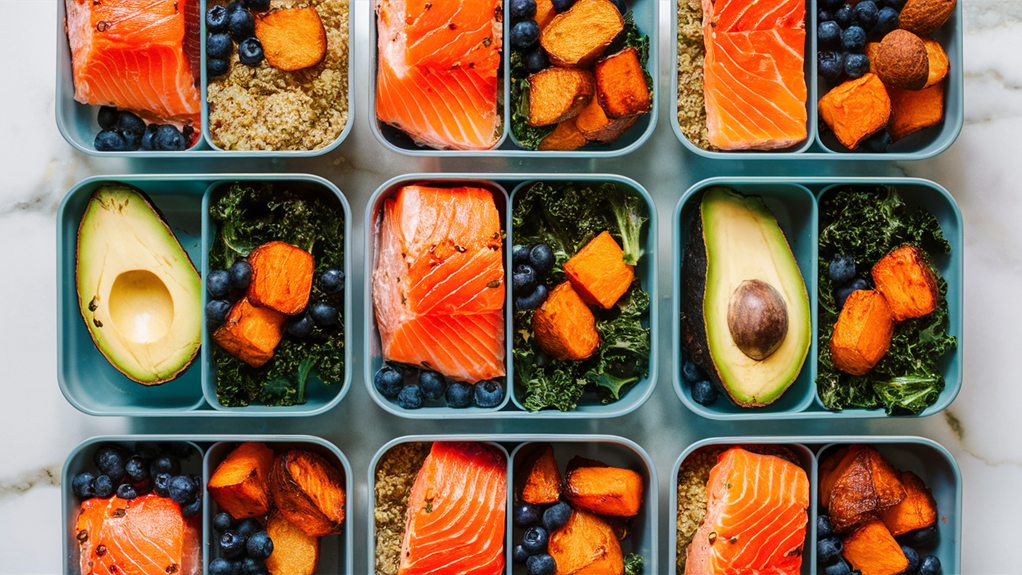
Creating a balanced meal plan starts with strategic food combinations that maximize your nutrient intake throughout the day. You’ll want to begin by selecting colorful vegetables and fruits as your foundation, then build around them with lean proteins, whole grains, and healthy fats to create well-rounded meals.
To further enhance your meal planning, consider incorporating budget-friendly options that don’t sacrifice nutrition, as budget-friendly diet tips can be a great resource for maintaining a healthy diet without overspending.
Start your day with fiber-rich foods like oatmeal topped with berries and nuts, which will keep you feeling full and energized. For lunch, aim to fill half your plate with vegetables, quarter with lean protein, and quarter with complex carbohydrates.
You can create satisfying dinner combinations by pairing nutrient-rich ingredients, such as quinoa with roasted vegetables and grilled fish, or bean-based stews with dark leafy greens.
Don’t forget to include healthy snacks between meals, combining protein and complex carbohydrates to maintain steady energy levels. For example, you might pair apple slices with almond butter, or enjoy hummus with carrot sticks.
Remember to stay hydrated throughout the day, as water helps your body properly absorb and utilize the nutrients from your carefully planned meals.
Shopping and Storage Tips
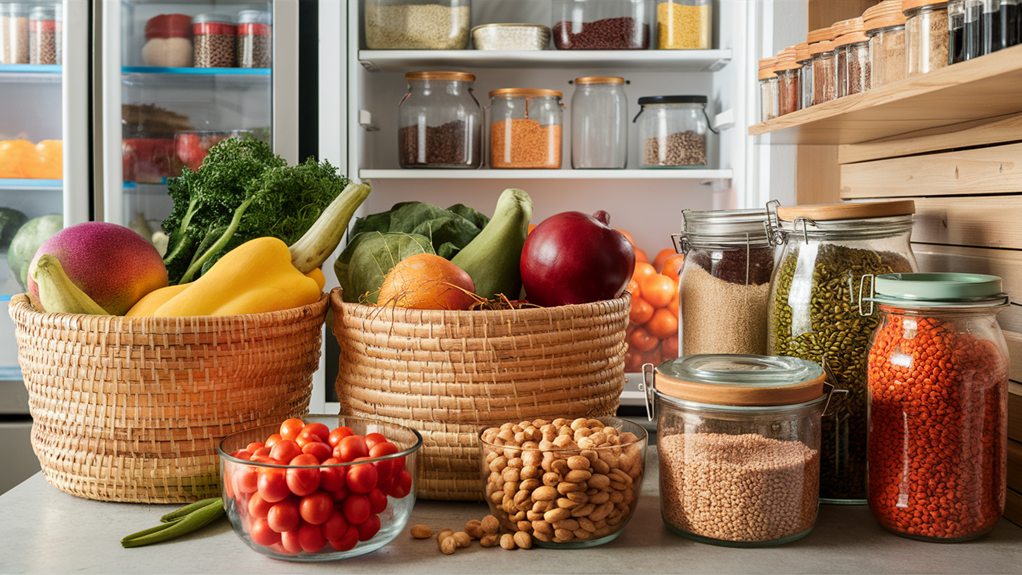
Smart shopping habits and proper storage techniques are essential for maintaining your nutrient-dense foods‘ quality and longevity. When you’re at the grocery store, start with the produce section and select fruits and vegetables that are firm, vibrant in color, and free from bruises or blemishes.
For leafy greens, look for crisp leaves without any yellowing or wilting, and always check the “best by” dates on packaged items. Remember that selecting nutrient-dense foods can help provide your body with the necessary understanding the role of macronutrients for energy production and overall health.
To maximize shelf life, store different foods properly as soon as you get home. Keep leafy greens wrapped in slightly damp paper towels inside a plastic bag with small holes for airflow, and place them in your refrigerator’s crisper drawer.
Most fruits and vegetables should be stored separately, as some produce ethylene gas that can speed up ripening in other foods. Don’t wash produce until you’re ready to use it, as excess moisture can promote bacterial growth.
For pantry items like nuts and seeds, store them in airtight containers in a cool, dark place to prevent oxidation and maintain their nutrient content. You’ll want to check your stored foods regularly and use the “first in, first out” method to prevent waste.
Common Myths and Facts
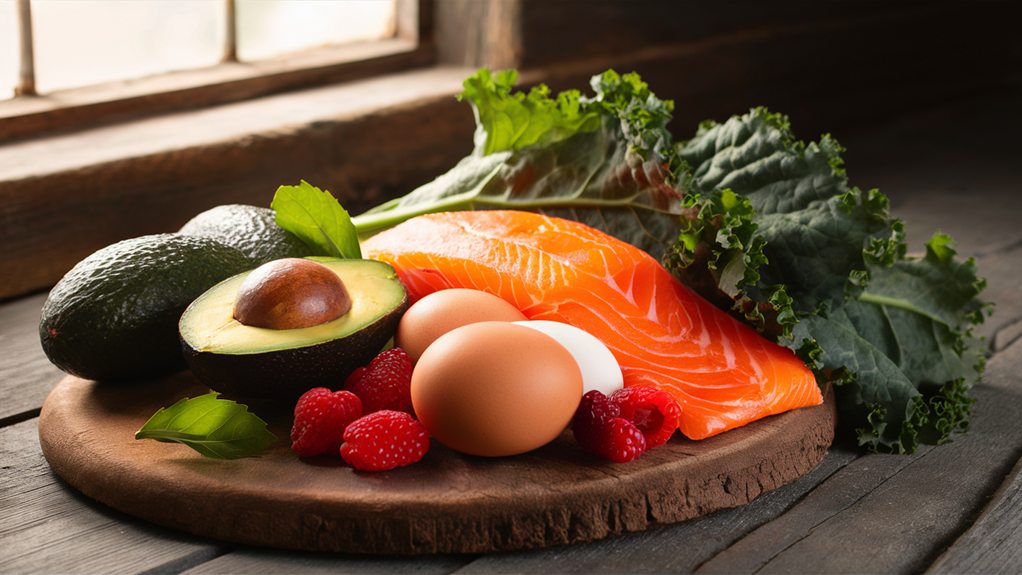
While proper storage methods help preserve nutrients in food, it’s equally important to separate fact from fiction when it comes to nutrient-dense eating.
You’ve probably heard that frozen vegetables are less nutritious than fresh ones, but that’s actually a myth. In many cases, frozen produce is picked at peak ripeness and flash-frozen, preserving its nutritional content. Additionally, incorporating high-fiber foods into your diet is crucial for maintaining gut health, as fiber plays a key role in regulating digestion and preventing disease the crucial role of fiber.
Another common misconception is that all fats are bad for you. Your body needs healthy fats, especially omega-3 fatty acids, which support brain health and reduce inflammation. You’ll find these beneficial fats in foods like salmon, walnuts, and flaxseeds.
Don’t fall for the myth that you need to eat specific food combinations to absorb nutrients properly, as your body is remarkably efficient at processing various nutrients simultaneously.
You might also believe that raw vegetables are always more nutritious than cooked ones, but this isn’t always true. Some nutrients, like lycopene in tomatoes, become more bioavailable when heated.
Understanding these facts will help you make better choices about the nutrient-dense foods you include in your diet.
